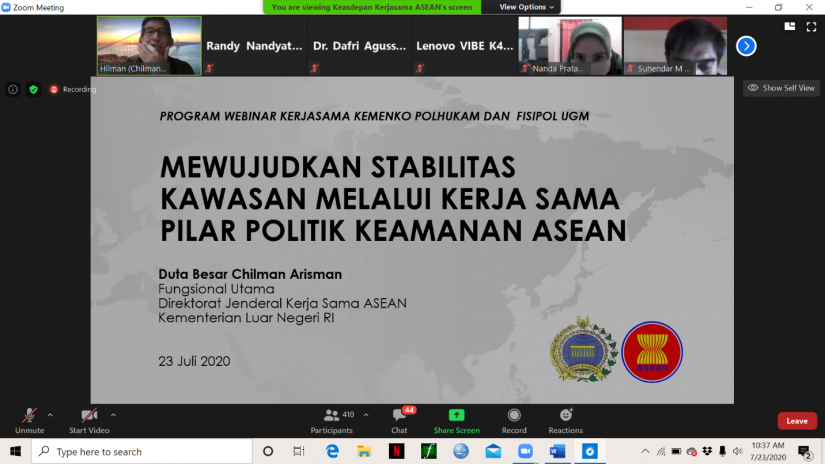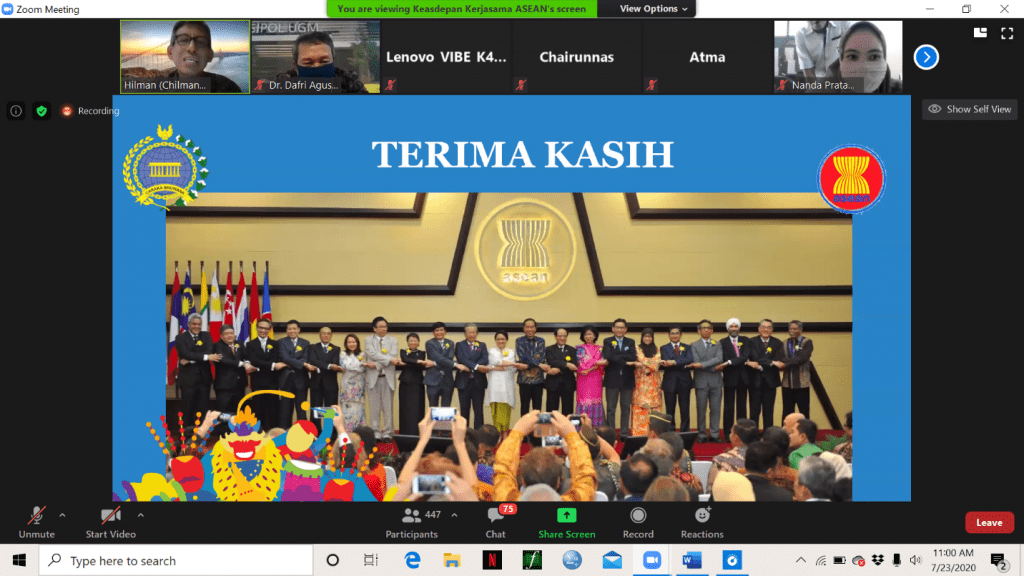
Yogyakarta, July 23rd 2020 – During this pandemic, ASEAN had a lot of contacts with partner countries such as South Korea, China and Japan. Besides that, ASEAN must anticipated various threats and challenges in this time. ASEAN Studies Center (ASC) Fisipol UGM discussed this theme on its webinar called ‘ASEAN Talk: Anticipated Traditional and Non-traditional Security Threats in the COVID-19 Pandemic Era – the Challenges of Indonesia and ASEAN’. This webinar was held on Zoom and YouTube on Thursday (23/7) from 10.00 a.m. In this webinar that joined by, at least, 500 people, ASC presented Coordinating Ministry for Political, Legal, and Security Affairs of Republic of Indonesia.
This webinar was moderated by Dr. Randy Wirasta Nadyatama, senior research fellow of ASC and also lecturer of Department of International Relations UGM. The webinar started with a welcoming speech from the Ambassador Dr. (HC) Lutfi Rauf, MA as the Deputy II of Field of Foreign Policy Coordination of Coordinating Ministry for Political, Legal, and Security Affairs. Lutfi explained about various threats that happened during pandemic, such as drugs smuggling and human trafficking. COVID-19 also changed geopolitical map, such as assertiveness of China. “Our hope is, in the middle of COVID-19, that action did not trigger conflicts in ASEAN,” Lutfi explained in his speech.

The second welcoming speech came from Dr. Wawan Mas’udi, the Vice Dean of Academic Field Fisipol UGM. Wawan also talked about a book titled as ‘COVID-19 Management Handling’ that published by UGM Press which one of the topics was relevant with this webinar, it was comparative dimension. There was also a part that explained about global government which would help us to revitalize in the post COVID-19. “COVID-19 has opened many pandora boxes, which brought up new possibilities,” Wawan said.
Webinar continued with the explanation from first speaker, Ambassador Chilman Arisman, the Main Functional Diplomat of Ministry of Foreign Affairs. His topic titled as ‘Realizing Regional Stability Through the Cooperation of the ASEAN Security Political Pillars’. Chilman gave a preface about ASEAN and its roles generally as a region with stable security. To maintain it, ASEAN had a guidelines in the form of ASEAN Political-Security Blueprint 2025. Chilman also explained about several challenges and efforts which had done by ASEAN, such as solved the internal conflicts or cross-countries, democracy, human rights, also transnational crimes. “ASEAN always works, so far it proved us that this is a stable region and in the middle of COVID-19 there was no conflicts between countries. ASEAN is not a region that makes proxy for a big power, and ASEAN always has forums,” Chilman said.
The next speaker was Dr. Muhammad Rum, Senior Research Fellow ASC and also a lecturer of Department of International Relations Fisipol UGM. Rum gave an explanation about ‘Measuring the Operationalization of Cooperation in Handling A Pandemic in ASEAN’. ASEAN had several initiatives in handling pandemic in various fields, such as disaster management, health, defense, and regional cooperation. Declaration of the ASEAN Summit on Coronavirus Disease also held on the last April, 14th 2020, after COVID-19 was declared as a pandemic. This declaration was also to prepare response mechanism toward pandemic on regional level by increasing the capacity and cooperation between sectors. “Cooperation in building effective public communication also had done, to prevent the public from hoax,” Rum explained. In the end of his explanation, Muhammad Rum talked about recommendations and opportunities of increasing cooperation in handling the pandemic in ASEAN.
The last speaker was, Dr. Dafri Agussalim, M.A. as Executive Director of ASC that talked about maritime security and non-traditional threats in Southeast Asia. According to Dafri, maritime security guarantees in ASEAN were the key to the future, because of the vast sea which owned by ASEAN countries. This rich sea could be a threat, both traditional and non-traditional, if not accompanied by good security system. This non-traditional threat had caused billions of dollars in losses and many deaths. If this issue was not handled well, then the objectives of Bangkok Declaration would be difficult to realize. “In the future, there must be a broader thinking way to deal with various issues,” Dafri said.
The webinar continued with response from Dinna Prapto Raharja, Ph.D. as an associate professor at Bina Nusantara and Abdullah Zulkifli, S.T., M.Si., as Department Assistance of ASEAN Cooperation of Coordinating Ministry for Political, Legal, and Security Affairs. This webinar ended at 12.45 p.m. and had uploaded on ASEAN Studies Center UGM YouTube channel.
